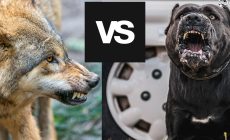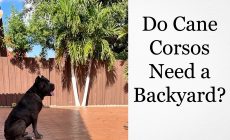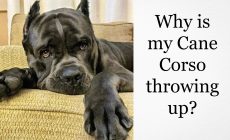If your Cane Corso isn’t eating anything, there must be a ton of questions popping up inside your head right now.
The best course of action to take when your cane corso isn’t eating anything is to meet an expert.
The expert will analyze the health of your cane corso and guide you about the things you can do.
As bloggers, we can only give you possible explanations; to know the exact cause, you have to visit the vet.
Now, let’s look at the possible causes below.

1: Dental problems
A toothache and gum pain can be really uncomfortable and may make your Cane Corso lose his appetite.
Notice if your Cane Corso is struggling to chew things and showing any signs of discomfort, such as drooling, yelping while chewing, or pacing.
If you notice these signs, instantly look inside the mouth of your Cane Corso to see if anything is stuck in his teeth, check if there are any lost teeth, and see if there are any swollen gums.
These kinds of pains can be really uncomfortable, so contact a vet for assistance.
2: Illness
Any underlying illness or physical injury can impact your cane corso’s appetite. In fact, a low appetite is one of the first signs of an underlying illness.
Do not take it lightly if your cane corso has not been eating anything for a long time. According to experts, after 10 hours, an empty stomach begins to send signals to the brain, which stimulates a hunger response. For this reason, experts suggest at least two meals per day for your dog.
If it has been more than 12 hours, you should check if everything is okay with your buddy. Contact a vet if possible.
You might also notice additional signs if your Cane Corso is struggling with any underlying condition, such as low energy, yelping, drooling excessively, vomiting, etc.
3: Change in environment
Dogs feel comfortable in the environment they are familiar with.
Changing your pet’s environment, like shifting to a new house or making huge changes in the backyard where your dog spends most of his time, might make your pet feel anxious, which may impact his appetite.
However, if your Cane Corso isn’t eating anything due to the change of environment, you shouldn’t worry much; just give him some time to adjust to the new environment, and he will make himself comfortable, once he’s comfortable with the new environment, he should start eating at his own pace.
4: Parasites
Both internal and external parasites are very dangerous for your cane corso; they may impact the appetite of your cane corso and cause other problems as well.
External parasites can be easy to spot; if your Cane Corso is suffering from them, you will notice signs such as constant scratching and chewing at the skin, hair loss, and thickened skin.
Eliminating external parasites is possible; you need to choose the best antiparasitic shampoo for your dog and manage his hygiene.
External parasites normally occur due to the negligence of the owners. Some owners don’t pay any attention to the cleanliness of their pet’s coat or skin.
While external signs are easier to detect, internal parasites can be really tricky to detect. If your Cane Corso has them, he may show signs such as diarrhea, weight loss, blood in the stool, weight loss, an inability to gain weight, a dull, coarse coat, or, in some cases, worms visible in the feces.
Internal parasites are very dangerous, and you would need an expert’s help. Remember, leaving this disease as is can make your Cane Corso’s appetite even less.
5: Weather
Most dogs, like humans, eat less during warmer weather. Dogs, too, must keep a steady body temperature, and in the summer, their bodies work harder to regulate heat. This means that their metabolism slows, resulting in decreased hunger and food intake.
Perhaps your Cane Corso has decreased his food intake because to the heat.
6: Age-related issues
Older Cane Corsos have very little appetite compared to young ones, as older dogs have less sense of smell and taste.
If your Cane Corso is in his later stage of life, it’s common to see your dog not showing any desire to eat anything and just taking more naps.
However, make sure to meet with an expert to get your pet’s health checked.
7: He’s a Picky Eater
Cane Corsos are usually not known for being fussy eaters, though some Cane Corsos may exhibit this habit.
Dogs that have developed fussy eating behavior from a young age, only eat things that they find tasty, and this habit can really frustrate owners, especially first-time owners.
It might be possible that your Cane Corso has this habit.
However, there are things that you can do to reduce fussy eating behavior in your dog. You may check out this post as it’s really helpful!
Read more about which dog breed is the picky eater here!
What Can You Do?
- Introduce new foods
Dogs have fewer taste buds than people, however, you may still wanna offer your dear friend new food to see what food your dog exactly likes the most.
- Top the food with a tasty topper
Adding tasty tooppers can make the boring food appear more enticing to your dog. Maybe your dog just needs a little bit of tasty toppings, that’s it.
- A walk before meals
A small amount of exercise or even a simple walk can affect your dog’s appetite. Also, make sure to separate the meals from the walks by at least 30 minutes.
- Warm the food
According to experts, heating the food to a tepid temperature boosts the smell, which may entice your Cane Corso to eat.
- Feed at consistent times
You should feed your Cane Corso twice every day. Regardless of his life stage, strive to divide his meals evenly throughout the day and adhere to a regular schedule. Instead of leaving food out for your dog to eat, try this!
Conclusion
Cane corsos generally have a strong food desire, but when a cane corso doesn’t show any desire to eat food, it could indicate many things. Health problems such as tooth pain, underlying illnesses, and parasites can affect the appetite.
Age is another factor that can reduce your pet’s desire to eat. However, if your Cane Corso has not been eating anything for more than 12 hours, you must visit a vet or contact a vet and ask for help.
The vet will analyze the health of your cane corso and inform you about the exact reason behind your cane corso not eating anything.
I hope this post was helpful to you.
Thanks for reading!







